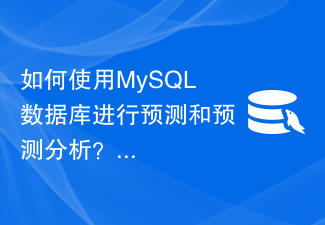
Oracle DECODE function is a very commonly used conditional expression function. Its main function is to convert the result of the expression according to the specified conditions and return the corresponding value. The syntax of the DECODE function is as follows:
DECODE(expr, search1, result1, search2, result2,...,default_result)
Among them, expr is the expression that needs to be judged, search1, search2... are the condition values to be matched, result1, result2... are required to match the condition value. The result value returned, default_result is the default return value when expr does not match any search value.
The following uses several specific cases to demonstrate the use of the DECODE function and its application scenarios.
- Return fixed results based on conditional values
Suppose we have an employee table Employee, which contains two fields: employee name and employee level. We want to return the corresponding text description based on the value of the employee level field. You can use the DECODE function to achieve this:
SELECT EmployeeName, DECODE(EmployeeLevel, 1, '初级员工', 2, '中级员工', 3, '高级员工', '其他') AS LevelDescription FROM Employee;
The above SQL statement will convert the employee level field in the Employee table into the corresponding text description and query the results.
- Replace null values with default values
Sometimes we need to replace null values in the table with default values, you can use the DECODE function To process:
SELECT ProductName, DECODE(Price, NULL, 0, Price) AS ActualPrice FROM Product;
The above SQL statement will replace the null value in the Price field in the Product table with 0 and query the results.
- Multi-condition judgment
The DECODE function can also be used to perform multi-condition judgment, similar to the effect of multiple if-else condition judgments.
SELECT OrderID, DECODE(Status, 1, '待处理', 2, '处理中', 3, '已完成', '未知状态') AS OrderStatus FROM Orders;
The above SQL statement will return the corresponding text description based on the order status field in the Orders table. If the status value is not within the given range, 'unknown status' will be returned.
- Classify data
The DECODE function can also be used to classify data, such as dividing grades into excellent, good, and passing , failed, etc.
SELECT StudentName, DECODE(Score,
90, '优秀',
80, '良好',
60, '及格',
'不及格') AS Grade
FROM Student;The above SQL statement classifies the grade fields in the Student table according to different score ranges and returns the corresponding grades.
In general, Oracle's DECODE function is very flexible and can convert and process data according to specific needs, improving the flexibility and readability of SQL queries. In practical applications, it can be used in conjunction with other SQL functions and conditional expressions to achieve richer data processing operations.
The above is the detailed content of Oracle DECODE function example analysis and application scenarios. For more information, please follow other related articles on the PHP Chinese website!
 如何使用MySQL数据库进行预测和预测分析?Jul 12, 2023 pm 08:43 PM
如何使用MySQL数据库进行预测和预测分析?Jul 12, 2023 pm 08:43 PM如何使用MySQL数据库进行预测和预测分析?概述:预测和预测分析在数据分析中扮演着重要角色。MySQL作为一种广泛使用的关系型数据库管理系统,也可以用于预测和预测分析任务。本文将介绍如何使用MySQL进行预测和预测分析,并提供相关的代码示例。数据准备:首先,我们需要准备相关的数据。假设我们要进行销售预测,我们需要具有销售数据的表。在MySQL中,我们可以使用
 如何使用 Go 语言进行数据可视化分析?Jun 10, 2023 am 10:46 AM
如何使用 Go 语言进行数据可视化分析?Jun 10, 2023 am 10:46 AM随着大数据时代的到来,数据可视化分析在各行各业中扮演着至关重要的角色。而Go语言作为一种快速、高效、安全的编程语言,也逐渐在数据可视化分析领域占据一席之地。本文将探讨如何使用Go语言进行数据可视化分析。一、Go语言常用的数据可视化库Plotly:可用于在浏览器中创建交互式的图形,支持多种图形类型,如线图、条形图、散点图、热力图等。Gonum/plo
 Linux下的实时日志监控与分析Jul 29, 2023 am 08:06 AM
Linux下的实时日志监控与分析Jul 29, 2023 am 08:06 AMLinux下的实时日志监控与分析在日常的系统管理和故障排查中,日志是一个非常重要的数据来源。通过对系统日志的实时监控和分析,我们可以及时发现异常情况并进行相应的处理。本文将介绍Linux下如何进行实时日志监控和分析,并提供相应的代码示例。一、实时日志监控在Linux下,最常用的日志系统是rsyslog。通过配置rsyslog,我们可以实现将不同应用程序的日志
 如何使用PHP进行性能分析和调优Jun 06, 2023 pm 01:21 PM
如何使用PHP进行性能分析和调优Jun 06, 2023 pm 01:21 PM作为一种流行的服务端语言,PHP在网站开发和运行中扮演着重要的角色。然而,随着PHP代码量的不断增加和应用程序的复杂性提高,性能瓶颈也越来越容易出现。为了避免这种问题,我们需要进行性能分析和调优。本文将简单介绍如何使用PHP进行性能分析和调优,为您的应用程序提供更高效的运行环境。一、PHP性能分析工具1.XdebugXdebug是一款广泛使用的代码分析工具,
 最近大火的Diffusion Model,首篇扩散生成模型综述!Apr 09, 2023 pm 08:31 PM
最近大火的Diffusion Model,首篇扩散生成模型综述!Apr 09, 2023 pm 08:31 PM本综述(Diffusion Models: A Comprehensive Survey of Methods and Applications)来自加州大学&Google Research的Ming-Hsuan Yang、北京大学崔斌实验室以及CMU、UCLA、蒙特利尔Mila研究院等众研究团队,首次对现有的扩散生成模型(diffusion model)进行了全面的总结分析,从diffusion model算法细化分类、和其他五大生成模型的关联以及在七大领域中的应用等方面展开,
 如何使用 Go 语言进行大数据分析?Jun 11, 2023 am 11:11 AM
如何使用 Go 语言进行大数据分析?Jun 11, 2023 am 11:11 AM随着数据规模逐渐增大,大数据分析变得越来越重要。而Go语言作为一门快速、轻量级的编程语言,也成为了越来越多数据科学家和工程师的选择。本文将介绍如何使用Go语言进行大数据分析。数据采集在开始大数据分析之前,我们需要先采集数据。Go语言有很多包可以用于数据采集,例如“net/http”、“io/ioutil”等。通过这些包,我们可以从网站、API、日志
 如何利用PHP和Elasticsearch实现结果聚合和分析Jul 17, 2023 pm 01:05 PM
如何利用PHP和Elasticsearch实现结果聚合和分析Jul 17, 2023 pm 01:05 PM如何利用PHP和Elasticsearch实现结果聚合和分析引言:随着互联网和信息技术的迅猛发展,数据量的爆炸式增长使得数据的存储、处理、分析变得越来越重要。而Elasticsearch作为一个开源的分布式搜索和分析引擎,具有强大的全文检索、实时分析和数据聚合能力,已经被广泛应用于各大行业中。在本文中,我们将介绍如何利用PHP和Elasticsearch结合


Hot AI Tools

Undresser.AI Undress
AI-powered app for creating realistic nude photos

AI Clothes Remover
Online AI tool for removing clothes from photos.

Undress AI Tool
Undress images for free

Clothoff.io
AI clothes remover

AI Hentai Generator
Generate AI Hentai for free.

Hot Article

Hot Tools

SublimeText3 Chinese version
Chinese version, very easy to use

mPDF
mPDF is a PHP library that can generate PDF files from UTF-8 encoded HTML. The original author, Ian Back, wrote mPDF to output PDF files "on the fly" from his website and handle different languages. It is slower than original scripts like HTML2FPDF and produces larger files when using Unicode fonts, but supports CSS styles etc. and has a lot of enhancements. Supports almost all languages, including RTL (Arabic and Hebrew) and CJK (Chinese, Japanese and Korean). Supports nested block-level elements (such as P, DIV),

Notepad++7.3.1
Easy-to-use and free code editor

DVWA
Damn Vulnerable Web App (DVWA) is a PHP/MySQL web application that is very vulnerable. Its main goals are to be an aid for security professionals to test their skills and tools in a legal environment, to help web developers better understand the process of securing web applications, and to help teachers/students teach/learn in a classroom environment Web application security. The goal of DVWA is to practice some of the most common web vulnerabilities through a simple and straightforward interface, with varying degrees of difficulty. Please note that this software

SecLists
SecLists is the ultimate security tester's companion. It is a collection of various types of lists that are frequently used during security assessments, all in one place. SecLists helps make security testing more efficient and productive by conveniently providing all the lists a security tester might need. List types include usernames, passwords, URLs, fuzzing payloads, sensitive data patterns, web shells, and more. The tester can simply pull this repository onto a new test machine and he will have access to every type of list he needs.







